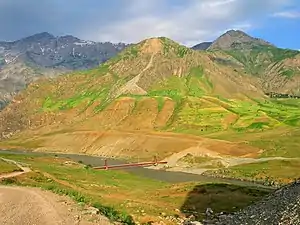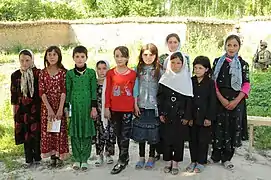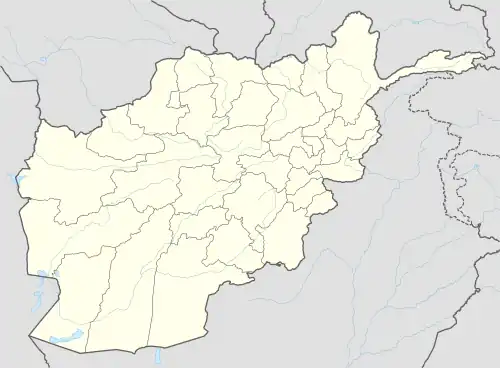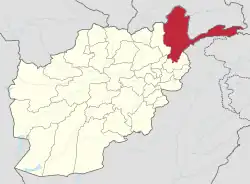Khwahan, Afghanistan
Khwahan (Persian: خواهان; Tajik: Хоҳон) is a town (and a fort) and the capital of Khwahan District, in Badakhshan Province in north-eastern Afghanistan.[1] It is located on the left bank of the Panj River, subregions of Darwaz.[2]

Khawan
خواهان Khwāhān | |
|---|---|
Town | |
 Young Khwahan's girls gather at the medical facility in Khwahan, Badakhshan Province, on 3 June 2012. | |
 Khawan Location of Khwahan in Afghanistan | |
| Coordinates: 37°53′19″N 70°13′10″E | |
| Country | |
| Province | Badakhshan |
| District | Khwahan |
| Elevation | 3,412 ft (1,040 m) |
| Time zone | +4.30 |
| • Summer (DST) | +4.30 |
.
History
After Alexander the Great overthrew the Persians, the area came under the rule of [3] the Greco-Bactrian king Euthydemus I and his son Demetrius I[4]
The village has a fort called Qala Khwahan. The fort is made of mud, in the shape of a square with three bastions on each face, with a capacity of 500 to 600 individuals. It is similar to most other forts in the area. For about two miles in each direction is cultivated land.[2]
The village contained roughly 160 houses around the turn of the 20th century.[2]
The inhabitants of this area speak Dari Persian and are Sunni Muslims; and engage in agriculture. They grow buckwheat, red and white barley, sesame, zucchini, corn, mung beans, peas, beans, potatoes.
Geography

The area is mountainous, with Kuh-e Kallat a prominent mountain in the district. This peak is 4090 meters high above sea level. The town sits on the Panj River and is one of very few Afghan towns with Tajikistan to its south. Road access is to Kulob, Tajikistan.
Climate
Khwahan’s climate is humid continental (Köppen Dsb), with an annual mean temperature of 9.4 °C (48.9 °F). September is the driest month, with 19 millimetres (0.7 in) of rain. In May, the precipitation reaches its peak, with an average of 172 millimetres (6.8 in).
| Climate data for Khwahan | |||||||||||||
|---|---|---|---|---|---|---|---|---|---|---|---|---|---|
| Month | Jan | Feb | Mar | Apr | May | Jun | Jul | Aug | Sep | Oct | Nov | Dec | Year |
| Record high °C (°F) | 18.6 (65.5) |
21.4 (70.5) |
28.3 (82.9) |
30.8 (87.4) |
36.8 (98.2) |
38.6 (101.5) |
39.6 (103.3) |
38.2 (100.8) |
33.7 (92.7) |
31.1 (88.0) |
25.4 (77.7) |
19.2 (66.6) |
39.6 (103.3) |
| Average high °C (°F) | 2.9 (37.2) |
4.5 (40.1) |
10.3 (50.5) |
15.8 (60.4) |
20.6 (69.1) |
24.7 (76.5) |
27.6 (81.7) |
27.2 (81.0) |
23.6 (74.5) |
17.3 (63.1) |
10.0 (50.0) |
4.6 (40.3) |
15.8 (60.4) |
| Daily mean °C (°F) | −3.1 (26.4) |
−1.1 (30.0) |
4.2 (39.6) |
9.1 (48.4) |
13.7 (56.7) |
17.9 (64.2) |
21.2 (70.2) |
21.0 (69.8) |
17.2 (63.0) |
10.8 (51.4) |
3.5 (38.3) |
−2.0 (28.4) |
9.4 (48.9) |
| Average low °C (°F) | −9.0 (15.8) |
−6.7 (19.9) |
−1.9 (28.6) |
2.3 (36.1) |
6.8 (44.2) |
11.0 (51.8) |
14.7 (58.5) |
14.7 (58.5) |
10.7 (51.3) |
4.3 (39.7) |
−3.1 (26.4) |
−8.5 (16.7) |
2.9 (37.3) |
| Record low °C (°F) | −23.9 (−11.0) |
−25.0 (−13.0) |
−25.5 (−13.9) |
−14.2 (6.4) |
−4.6 (23.7) |
4.5 (40.1) |
7.7 (45.9) |
2.4 (36.3) |
−0.5 (31.1) |
−7.1 (19.2) |
−25.7 (−14.3) |
−22.6 (−8.7) |
−25.7 (−14.3) |
| Average precipitation mm (inches) | 92 (3.6) |
117 (4.6) |
139 (5.5) |
152 (6.0) |
172 (6.8) |
85 (3.3) |
33 (1.3) |
20 (0.8) |
19 (0.7) |
52 (2.0) |
75 (3.0) |
83 (3.3) |
1,039 (40.9) |
| Source: Climate-Data.org,[5] NASA Power[6] (Extremes) | |||||||||||||
References
- "NGA GeoName Database". National Geospatial-Intelligence Agency. Archived from the original on 2008-05-22. Retrieved 2008-05-27.
- Adamec, Ludwig W., ed. (1972). Historical and Political Gazetteer of Afghanistan. Vol. 1. Graz, Austria: Akadamische Druck-u. Verlangsanstalt. pp. 107–108.
- Shane Wallace Greek Culture in Afghanistan and India: Old Evidence and New Discoveries p.206
- Osmund Bopearachchi, Some Observations on the Chronology of the Early Kushans, p.48
- "Climate: Khwahan". Climate-Data.org. Retrieved 3 September 2022.
- "Data Access Viewer". Retrieved 11 October 2022.
